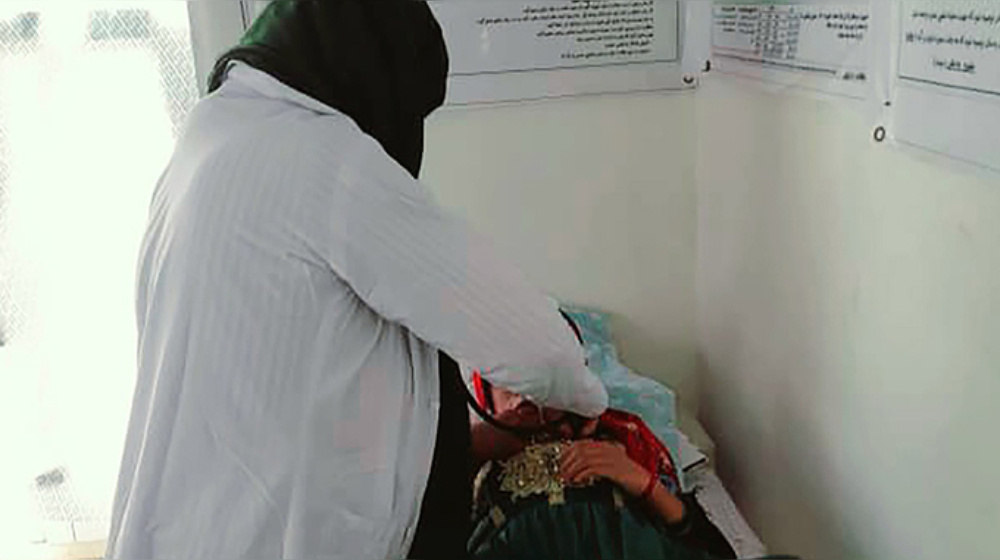News
Across Afghanistan, resourceful midwives brave multiple barriers to ensure maternal health and safe births
- 15 August 2023
News
KANDAHAR, Afghanistan – A week after delivering her baby girl, Ms. Husun went back to the family health house where she gave birth, bringing food for the midwife who had assisted her.
“This is an expression of my gratitude for your life-saving support,” Ms. Husun told her midwife, Durdana Samandar.
Ms. Samandar’s quick thinking had turned what could otherwise have been a crisis into a celebration: Ms. Husun had gone to the facility, which is supported by UNFPA, the United Nations sexual and reproductive health agency, with what she thought was a stomach ache. Although aware she was pregnant, Ms. Husun was shocked to discover she was actually in labour.
“She came to the clinic with her mother-in-law, asking for medicine for her abdominal pain,” recalled Ms. Samandar, who was trained by UNFPA and has been working at the family health house since November 2022. “But I noticed she was pregnant, so I did a further examination and found out that she was in an advanced stage of labour.”
Ms. Husun’s mother-in-law told the midwife she would bring her home to give birth, which is how she delivered her own two children. But the midwife told her Ms. Husun needed the immediate care of a skilled birth attendant.
“I explained the complications and dangers that could arise if she left the clinic and walked four hours home. I told them that the health house was here to support safe deliveries and that I am here to ensure that mothers and babies are safe,” Ms. Samandar said.
Ms. Husun was thankful they listened to the midwife: This was her first time delivering in a health facility and she has seen its potential to save lives. “Had we insisted on going home, the situation could have been very different,” she said.
A combination of challenges for women and girls
After years of conflict and insecurity, Afghanistan’s health system is severely compromised. And with women and girls’ freedom of movement increasingly restricted, so is their access to essential services, especially for those living in remote areas, where the nearest health facility is often hours away by foot over treacherous land.
The situation is at best challenging, at worst deadly for the estimated 20,000 women who give birth each month in hard-to-reach areas. It is in these communities that the majority of maternal and childhood illnesses and deaths occur – Afghanistan has one of the world’s highest rates of maternal deaths, with a woman dying every two hours during pregnancy or childbirth, mainly from entirely preventable causes.
Under these circumstances, women health workers are deeply appreciated among their communities, with many women and newborns benefiting from their expertise. Ms. Husun said she hopes others will turn to these facilities, telling UNFPA “I found it a safe haven for mothers and newborns”.

“I have not lived a healthy day since the birth”
Further north in the province of Badghis, Ms. Jan developed a fever and body pains days after delivering her fourth child. “I gave birth to my son at home. My mother-in-law and a neighbour, a traditional birth attendant, assisted me,” Ms. Jan recalled. “I lost a lot of blood, although everything went well with the delivery.”
But danger signs soon emerged. “I had not lived a healthy day since [the birth]. I had severe body pains, headache, back pain, and I couldn’t breastfeed my baby because I didn’t have enough milk,” she explained.
A month later and still in agony, Ms. Jan was in fear for her life. “I couldn’t even get up to take care of my child. I told my husband to take me to a hospital, or I might not live to see the end of that day,” she said.
There was another problem, however. “We didn’t have any transportation to get to the nearest hospital, which is about four hours away.” With no other choice, her husband propped Ms. Jan on a donkey, wrapped her and their newborn in a blanket and set out on the long journey to hospital.
They were approaching the next village when they heard an announcement from the mosque, advising that doctors and midwives were visiting and anyone with a health concern could gather there. As they reached the mosque, Ms. Jan was taken to a house where midwives were attending to patients, part of a UNFPA-supported mobile health outreach.
Midwives save lives across the country
The mobile clinic, funded by USAID, is one of the 134 supported by UNFPA and partners across Afghanistan. The teams provide free maternal and newborn care to people living in hard-to-reach communities like those in Badghis, which has three clinics in operation.
UNFPA also supports over 360 family health houses with funding from the Governments of Canada and Italy. In the first six months of 2023, they provided reproductive health and midwifery services to some 1,780 people.
While Ms. Jan was receiving care from the midwife, her husband sat in on a health education session. “Ever since, my husband has been speaking to everyone about midwives, doctors, healthy lifestyles and other information he learned,” said the new mother, who, together with her baby, is now fully recovered.
“He also learned about the importance of delivering in a health facility,” she added. “No one in our family went to a midwife for delivery. Our men are often out to work the whole day and the women cannot travel alone outside the village without a companion.”
UNFPA’s programmes in Afghanistan are particularly vital following the withdrawal of development assistance after the Taliban takeover of the country in August 2021. Strengthening these facilities is a priority for UNFPA as it strives to meet basic reproductive health needs in Afghanistan and increase access to antenatal, maternal and newborn care.